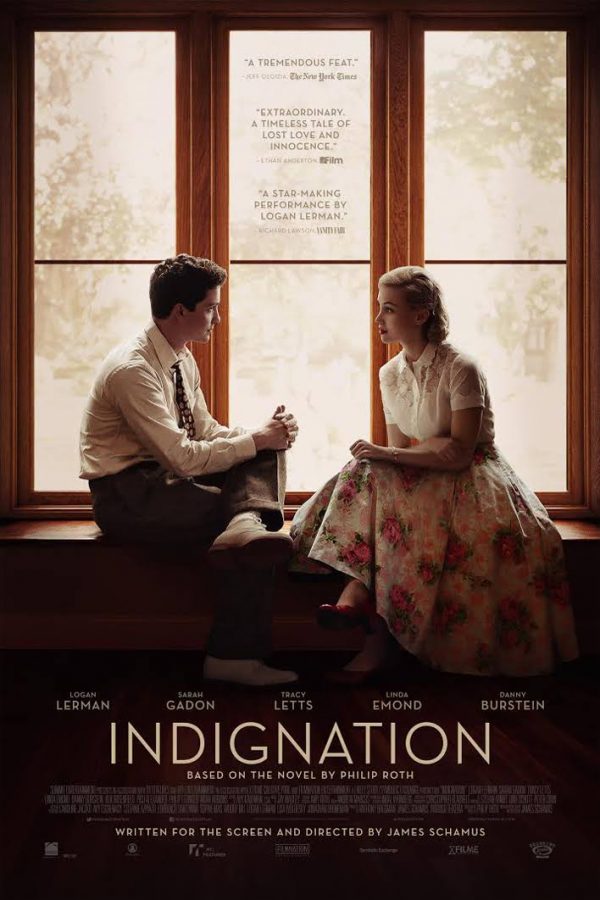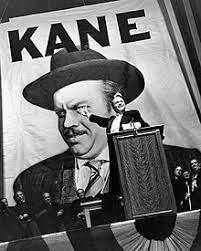Indignation: Restraint & Resentment through Innocence
December 2, 2016
Indignation perfectly encompasses the difficulties of post-war, in addition to lust, temptation, and overbearingness through the innocence of young-adulthood. Adapted from Philip Roth’s novel, this film evokes the tense situations that youth in the 1950s experienced in the wake of communism, war, and cultural, religious, and racial discrimination. For a film paired with Roth’s acclaimed narrative style provoking emotions of vexation and empathy and the skillful directing and cinematography of James Schamus, CEO of Focus Features and producer of such films like the universally renowned Brokeback Mountain, I expected nothing less than hauntingly beautiful.
Indignation is the story of a promising yet arrogant, situational-escapist, self-proclaimed atheist of Jewish-extraction: Marcus Messner, played by Logan Lerman. Faced with the imperious nature of his father and the fear of being drafted, Marcus enrolls in and escapes from Newark, New Jersey to a college that he believes is far enough from his father’s tyranny in Ohio. Marcus, originally set with the goal of achieving high academic honor as he has done his whole throughout his academic life, is taken back on the eve of his admiration for Olivia Hutton, played by Sarah Gadon. Olivia’s suspicious past and unstable mind fail to affect Marcus’s love for her. Seemingly borderline obsessive, he is pleased to realize the mutuality of these emotions for admiration. Despite his mother’s warning of seeking a woman with cuts on her wrists, he pursues her until she suffers a mental breakdown and disappears from his life. Eventually being drafted into the Korean war, Marcus, too, suffers from mental anguish and unanswered questions.
Logan Lerman had not appeared to display great promise as an actor until now. His previous works in The Perks of Being a Wallflower and The Percy Jackson Series were a good display for what they were: young-adult adaptations; however, his role in Indignation proves he is worthy of much more in the way of praise and admiration. He puts everything into this role and perfectly captures Roth’s descriptions and narration. His accent, mannerisms, and tenseness perfectly resemble my thoughts of Marcus as I read the novel. Sarah Gadon, most notably recognized from A Royal Night Out and her stellar performance in Enemy, also allows for a beautiful rendition of the novel. While the movie did not stress her mental situation as much as it should and could have, she worked well with the screentime she possessed. Gadon perfectly portrays her character’s past in rehab and suicidal attempts with magnificently crafted camera angles, shots, and empathetic acting. Topped with the tense, suspenseful, demanding performance of Tracy Letts as Dean Caudwell, this film was skillfully cast.
Coupled with the cinematography resembling a period-piece and surprising acting ability, James Schamus chose Jay Wadley, a seemingly unknown composer, to blend this film and create a cohesive flow from scene to scene. Wadley, distinctively, chose to score this film with a string orchestra. The film opens with a low cello which gives off an immediate sense of urgency, tension, and drama. The light, seemingly joyous, violin plucks paired with the long low notes of the cello harmonize to exemplify Marcus’s life: a constant battle between the light-heartedness youth and the stressed realization of war and adulthood. With a sole pianist, Jay Wadley gives off the impression that Marcus, too, feels alone in his studies, home, and college life until he finds love. The numerous pieces are short-lived but are able to set a mood of drama without large orchestral booms and power.
Albeit, Indignation is not quite a groundbreaking film that stresses a new idea or new way of cinematography, but it is a beautiful one nonetheless that gives surprising, career-making performances that might as well be Philip Roth’s best film adaption yet.












